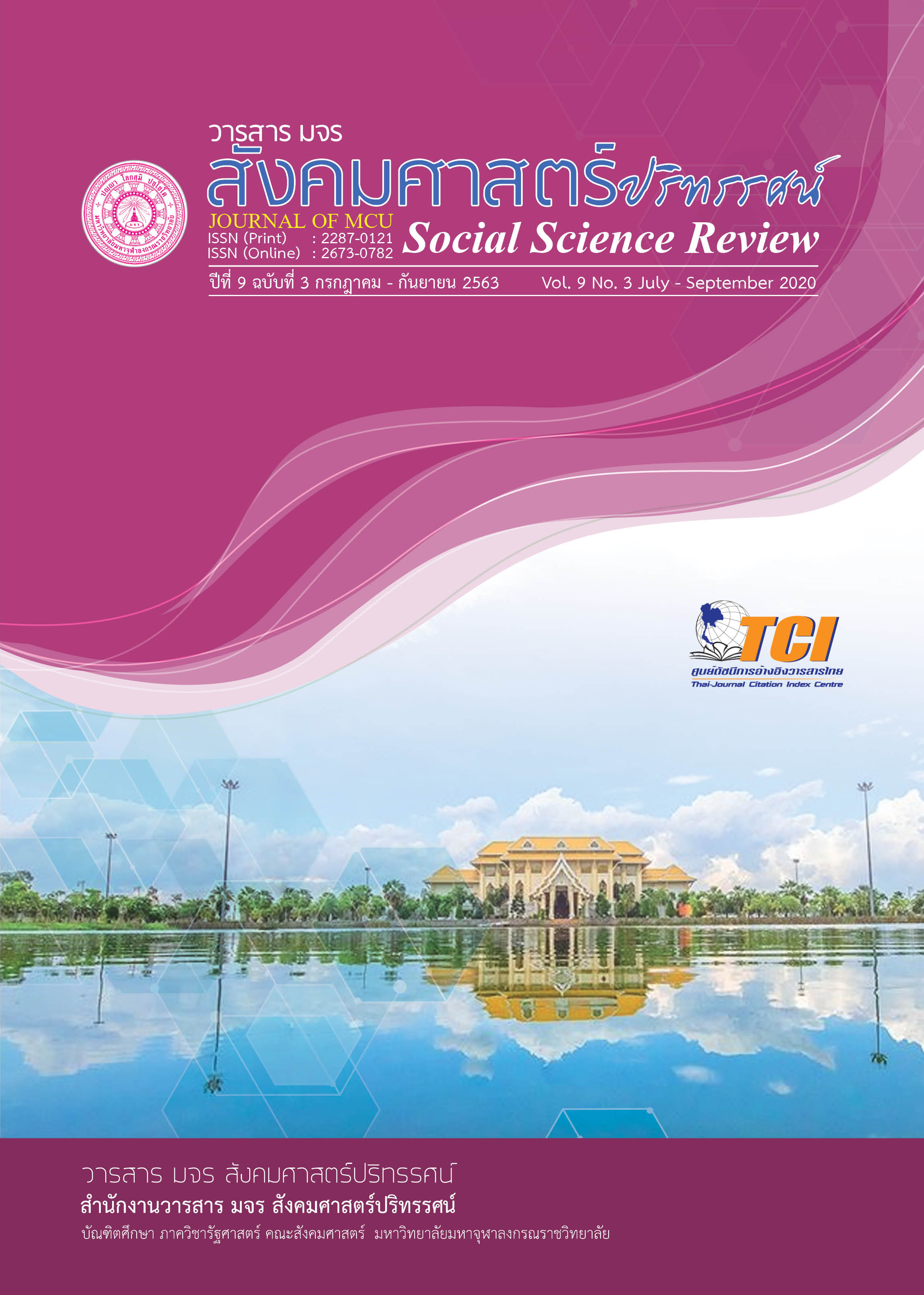การพัฒนาศักยภาพสถาบันทางสังคมในการปลูกฝังจิตสำนึกคุณธรรมและค่านิยมสุจริตในสังคมไทย
คำสำคัญ:
การพัฒนาศักยภาพ, สถาบันทางสังคม, สำนึกคุณธรรมและค่านิยมสุจริตบทคัดย่อ
บทความวิจัยนี้มีวัตถุประสงค์เพื่อศึกษาการพัฒนาศักยภาพสถาบันทางสังคมในการปลูกฝังจิตสำนึกคุณธรรมและค่านิยมสุจริตในสังคมไทย เป็นการวิจัยเชิงปฏิบัติการ ทำการวิเคราะห์เนื้อหาจากกรณีศึกษาของโครงการย่อยทั้ง 3 โครงการ และการสนทนากลุ่มเฉพาะร่วมกับผู้ทรงคุณวุฒิจากสถาบันครอบครัว สถาบันพระพุทธศาสนา สถาบันการศึกษา/การปกครอง ด้วยวิธีการสุ่มแบบเจาะจง จำนวน 9 รูป/คน ซึ่งวิเคราะห์ข้อมูลโดยใช้เทคนิคการวิเคราะห์เนื้อหาเชิงพรรณนา และการประเมินผลปฏิบัติการ (รายตัวชี้วัด) จากอาสาสมัครผู้เข้าร่วมกิจกรรม จำนวน 50 คน ซึ่งวิเคราะห์ข้อมูลโดยใช้สถิติ คือ ค่าความถี่ ค่าร้อยละ ค่าเฉลี่ย และค่าเบี่ยงเบนมาตรฐาน ผลการวิจัยพบว่า การพัฒนาศักยภาพสถาบันทางสังคมในการปลูกฝังจิตสำนึกคุณธรรมและค่านิยมสุจริตในสังคมไทย มีลักษณะเป็น “กิจกรรมเครือข่ายคนรุ่นใหม่ต้านทุจริต” ในรูปแบบของกิจกรรมจิตอาสาที่แสดงออกถึงความรับผิดชอบต่อสังคม ซึ่งประกอบด้วยกิจกรรมเชิงวิชาการเพื่อปลูกฝังจิตสำนึกคุณธรรมและค่านิยมสุจริตแก่สมาชิกเครือข่ายคนรุ่นใหม่ต้านทุจริต และกิจกรรมเชิงปฏิบัติการเพื่อเผยแพร่สำนึกคุณธรรมและค่านิยมสุจริตหรือต่อต้านทุจริตไปสู่ชุมชนและสังคม
เอกสารอ้างอิง
กรมการศาสนา กระทรวงวัฒนธรรม. (2554). ความรู้ศาสนาเบื้องต้น. กรุงเทพฯ: โรงพิมพ์ชุมนุมสหกรณ์การเกษตรแห่งประเทศไทย จำกัด.
กฤษฎา แซ่หลี. (2562). รูปแบบการปลูกฝังคุณธรรมและจริยธรรมสำหรับวัยรุ่นไทยยุคใหม่ ตามหลักพุทธธรรม ผ่านกลไกการขับเคลื่อนโครงการคลินิกคุณธรรม ของพระธรรมวิทยากร. วารสาร มจร สังคมศาสตร์ปริทรรศน์, 8(1), 59-70.
คณะกรรมการฝ่ายวิจัย โรงเรียนนวมินทราชินูทิศ สตรีวิทยา พุทธมณฑล. (2557). คุณลักษณะสุจริตของนักเรียนโรงเรียนนวมินทราชินูทิศ สตรีวิทยา พุทธมณฑล (รายงานการวิจัย). กรุงเทพฯ: สำนักงานเขตพื้นที่การศึกษามัธยมศึกษาเขต 1.
คณะกรรมการฝ่ายวิจัยโรงเรียนสุจริต โรงเรียนวิสุทธิกษัตรี. (2559). การพัฒนารูปแบบกิจกรรมต้นกล้าศรีวิสุทธิ์เพื่อพัฒนาคุณลักษณะสุจริตของนักเรียนโรงเรียนวิสุทธิกษัตรี จังหวัดสมุทรปราการ (รายงานการวิจัย). กรุงเทพฯ: กระทรวงศึกษาธิการ.
จารุวรรณ สุขุมาลพงษ์. (2556). แนวโน้มของคอร์รัปชันในประเทศไทย (รายงานการวิจัย). กรุงเทพฯ: สำนักงานกฎหมาย สำนักงานเลขาธิการสภาผู้แทนราษฎร.
ถวิลวดี บุรีกุล และคณะ. (2554). การศึกษาเพื่อเสริมสร้างความซื่อตรงในสังคมไทย (รายงานการวิจัย). กรุงเทพฯ: สถาบันพระปกเกล้า.
บงกช สุทัศน์ ณ อยุธยา. (2557). แนวทางเสริมสร้างธรรมาภิบาลในสังคมไทยด้วยการสร้างจิตสำนึก ค่านิยม ผ่านสุภาษิต คำพังเพย. วารสารสำนักงานผู้ตรวจการแผ่นดิน, 7(2), 30.
ประสิทธิ์ โฆวิไลกูล. (2548). กฎหมายแพ่งหลักทั่วไป: คำอธิบายประมวลกฎหมายแพ่งและพาณิชย์ มาตรา 4-14 (พิมพ์ครั้งที่ 3). กรุงเทพฯ: สำนักพิมพ์นิธิธรรม.
พระธรรมปิฎก (ป.อ. ปยุตฺโต). (2541). ธรรมกับสังคมไทยในสถานการณ์ปัจจุบัน. กรุงเทพฯ: โรงพิมพ์คุรุสภาลาดพร้าว.
พระพรหมคุณาภรณ์ (ป.อ. ปยุตฺโต). (2553). พจนานุกรมพุทธศาสน์ ฉบับประมวลศัพท์ (พิมพ์ครั้งที่ 14). กรุงเทพฯ: บริษัท ธนธัชการพิมพ์.
พระพรหมเวที (สุเทพ ผุสฺสธมฺโม). (2563). การเสริมสร้างค่านิยมสุจริตของสถาบันครอบครัวตามหลักพระพุทธศาสนา. วารสาร มจร สังคมศาสตร์ปริทรรศน์, 9(2), 1-12.
พัทยา สายหู. (2544). กลไกของสังคม (พิมพ์ครั้งที่ 10). กรุงเทพฯ: จุฬาลงกรณ์มหาวิทยาลัย.
พิศมัย เทียนทอง. (2553). การดำเนินการพัฒนาคุณธรรมจริยธรรมด้านความซื่อสัตย์สุจริตของนักเรียนโรงเรียนบ้านเขามะกา สังกัดสำนักงานเขตพื้นที่การศึกษาสระแก้ว เขต 1 (วิทยานิพนธ์ปริญญาศึกษาศาสตรมหาบัณฑิต). ปทุมธานี: มหาวิทยาลัยปทุมธานี.
ศิริพร ปัญญาเสน. (2551). ภาพพจน์ของความสุจริตและความโปร่งใสของประชาคมในองค์การบริหารส่วน ตำบลพิชัย จังหวัดลำปาง (รายงานการวิจัย). ขอนแก่น: วิทยาลัยปกครองส่วนท้องถิ่น.
สัมฤทธิ์ ยศสมศักดิ์. (2549). รัฐประศาสนศาสตร์: แนวคิดและทฤษฎี. กรุงเทพฯ: เอ็กซ์เปอร์เน็ท.
Angang, H. (2002). Public Exposure of Economic Losses Resulting from Corruption. China & World Economy Journal, 10(4), 44.
Gbenga, L. (2007). Corruption and Development in Africa: Challenges for Political and Economic Change. Humanity & Social Sciences Journal, 2(1), 112.
ดาวน์โหลด
เผยแพร่แล้ว
รูปแบบการอ้างอิง
ฉบับ
ประเภทบทความ
สัญญาอนุญาต
ลิขสิทธิ์ (c) 2020 วารสาร มจร สังคมศาสตร์ปริทรรศน์

อนุญาตภายใต้เงื่อนไข Creative Commons Attribution-NonCommercial-NoDerivatives 4.0 International License.
เพื่อให้เป็นไปตามกฎหมายลิขสิทธิ์ ผู้นิพนธ์ทุกท่านต้องลงลายมือชื่อในแบบฟอร์มใบมอบลิขสิทธิ์บทความให้แก่วารสารฯ พร้อมกับบทความต้นฉบับที่ได้แก้ไขครั้งสุดท้าย นอกจากนี้ ผู้นิพนธ์ทุกท่านต้องยืนยันว่าบทความต้นฉบับที่ส่งมาตีพิมพ์นั้น ได้ส่งมาตีพิมพ์เฉพาะในวารสาร มจร สังคมศาสตร์ปริทรรศน์ เพียงแห่งเดียวเท่านั้น หากมีการใช้ภาพหรือตารางหรือเนื้อหาอื่นๆ ของผู้นิพนธ์อื่นที่ปรากฏในสิ่งตีพิมพ์อื่นมาแล้ว ผู้นิพนธ์ต้องขออนุญาตเจ้าของลิขสิทธิ์ก่อน พร้อมทั้งแสดงหนังสือที่ได้รับการยินยอมต่อบรรณาธิการ ก่อนที่บทความจะได้รับการตีพิมพ์ หากไม่เป็นไปตามข้อกำหนดเบื้องต้น ทางวารสารจะถอดบทความของท่านออกโดยไม่มีข้อยกเว้นใดๆ ทั้งสิ้น





